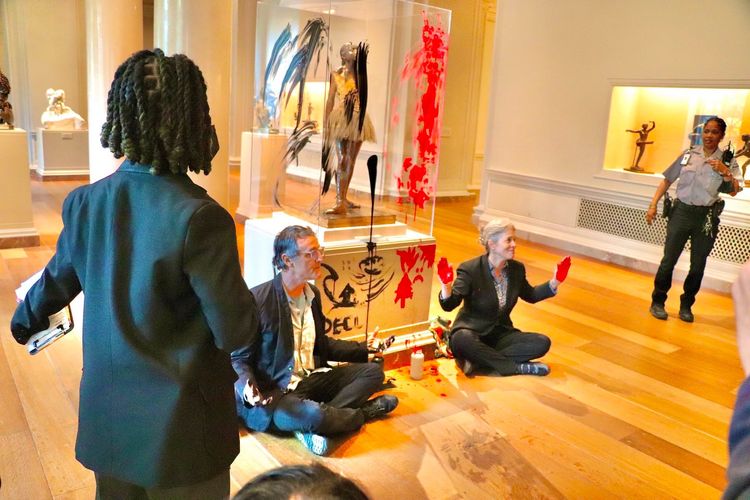The Roe-Climate Intersection
The Roe-Climate Intersection
By Amy Westervelt
In this week’s podcast episode, among other things, we talked a bit about the various intersections between the leaked Supreme court draft opinion overturning Roe v Wade and climate—from the signal it sends that the Court is more than ready to overturn precedent to the fact that the very same people who have targeted reproductive rights have also worked against climate action.
There are distinct ecofascist undertones here, particularly with the language Justice Alito uses in the draft around “domestic supply of infants," which yes comes from the Centers for Disease Control and that doesn't make it less weird and gross. I highly recommend listening to This Land Season 2 for a deep dive into the way white supremacy, the adoption industry, and legalization of abortion intersect. In broad strokes the legalization of abortion, combined with increased access to birth control and the reduction of the stigma around unmarried motherhood dramatically decreased the number of babies available for adoption in the U.S. from the 1970s onward. It particularly decreased the number of white babies up for adoption right around the time that evangelicals got brought into the rightwing anti-civil rights crusade via the abortion debate. One of the mandates for evangelicals involved in the anti-abortion fight has been to foster and adopt children.It’s often set up as a sort of pathway to Heaven and a way to show that you’re serious about anti-abortion morality. As American couples began looking outside the country to adopt, adoption rates skyrocketed in Russia, China, and throughout Latin America. Un some cases, it prompted countries to bar American families in particular from adopting for fear that they were losing large numbers of children. With international adoption less available and fewer and fewer white babies put up for adoption in the U.S., a preference has emerged for white-adjacent babies—mixed race kids, Latinx, and Indigenous children are all adopted at a higher rate than Black children, for example, and adoption agencies routinely include infants’ complexion in emails to prospective adoptive parents.
It’s also fueled the anti-abortion fight even more, but here’s where the ecofascist part comes in: many of the same people wanting to ban abortion also want to ban immigration. It all feeds into the “Great Replacement Theory,” long championed by Tucker Carlson and his ilk, and specifically noted as the inspiration for the explicitly ecofascist El Paso shooting in 2019. The “theory” is that there is an intentional, global plan orchestrated by “national and global elites” to replace white, Christian, European populations with nonwhite, non-Christian ones. Yeah. It’s dark and complicated and disturbing and it’s pretty embedded in the founding of this country. We’ll be talking about all that and more on some upcoming episodes of the podcast. In the meantime, the Roe decision also carries some specific legal implications for climate cases that I’ll be keeping an eye on:
- Massachusetts v EPA - This is the big precedent climate folks are keeping an eye on. This case established the EPA’s authority to regulate greenhouse gas emissions under the Clean Air Act, even though the words “greenhouse gas emissions” weren’t included in the law originally. There’s a case the justices are considering right now—West Virginia v EPA—in which they could start to whittle away that authority. If Mass. v EPA goes, not only does it make it more difficult to enact climate policy, it means the government can’t even exercise the authority it currently has to regulate greenhouse gas emissions.
- Climate Liability Cases - There are more than two dozen climate liability cases making their way through the courts at the moment. One has already been tossed up to the Supreme Court for a small administrative issue, and based on the court’s willingness to overturn key precedent like Roe, it seems highly unlikely that they would set a positive precedent for climate litigation by ruling against oil companies in any of these cases. (That said, these cases can still deliver wins at the state level, and via documents and information that might come up during discovery, so this doesn’t render them moot at all).
- The Next Citizens United? Oil company lawyers have consistently been making a free speech argument in response to not only the liability suits but the handful of fraud cases filed against them as well. Their argument is that their advertising and marketing campaigns downplaying the urgency of climate change or overplaying their role in addressing it constitute political speech, rather than commercial speech that’s subject to fraud and liability laws. If that argument makes it to the Supreme Court, they may well decide to further blur or even obliterate the line between fraud and protected speech, building on the Citizens United ruling, which expanded the individual rights of corporations and enabled them to give huge amounts of money anonymously to political candidates and campaigns, creating the whole dark money universe we’re dealing with today.
This is today's free feature. To read all of the rest of today's stories, upgrade now!
Silence Isn’t Civil. Or Civic.
By Mary Annaïse Heglar
Earlier this week, I published an essay with The New Republic in which I lamented the madness of moderate politicians. Not only is centrism a pointless exercise when one side of the political spectrum has gone full fascist, it’s ridiculous in the face of the climate crisis. Simply put, you can’t have a “climate” package that reduces greenhouse gas emissions AND expands fossil fuel infrastructure. It’s not like the two will cancel each other out. Instead, the fossil fuel incentives will reverse anything given to bolster clean energy—by several orders of magnitude.
I got a good bit of blowback on the old Twitter machine about how unproductive my piece was because criticizing the Democrats only helps the Republicans and we shouldn’t be eating our own. Somehow, it’s lost on folks that our civic duty doesn’t end when we leave the voting booth. It actually is our job to hold the people we voted for accountable. When they don’t do their jobs, it’s on us to get them back in line. They work for us, remember? The work of being someone’s manager doesn’t stop once you hire them.
Storytelling Is a Climate Solution
By Amy Westervelt
Last year I recommended folks check out El Tema, a brilliant web series about what climate change looks like on the ground in Mexico right now (if you haven’t watched it yet, go fix that!). Then last month, I got to take part in the Doc Society Climate Storytelling Lab and El Tema’s impact producer Pablo Montaño was there with an update on the project. He even gave Hot Take a shout-out for helping to inspire one of the many incredible things they wound up doing with the series. That work—from seeding community agriculture to developing educational guides for schools to convincing Mexicans to break up with the country’s big oil company Pemex—is ongoing, all over the country, and really incredible. Their approach is inspiring and I asked Pablo to share a bit more about it in a quick Q&A.
April Climate Coverage Missed the Mark
By Mary Annaïse Heglar
April is supposed to be Earth Month, but by looking at the scale of climate coverage, you wouldn’t be able to tell. According to the folks at the Media and Climate Change Observatory, global media attention to climate change in April 2022 increased a mere 4 percent from March 2022, but was down 13 percent from April 2021. In the United States, print coverage decreased by 2 percent from March 2022, but television coverage increased 86 percent from the previous month.
Before you celebrate that jump in television coverage… consider that not all press is good press. First of all, the combined network and cable coverage fell 48 percent from last year, but even more concerning is the quality of this year’s coverage. Most segments were shallow and focused on personal consumption and ways to “reduce your carbon footprint.” Fox News used the day to attack climate activists and undermine established climate science. Over there, it’s all about how climate policy is taking things away from you for no good reason and painting the people who want a livable planet as somehow elite. It sounds absurd, but it’s actually a really intoxicating story and falls neatly into the “us vs. them” narrative the right wing loves. (We talked a bit about how this plays out on Tucker Carlson on the latest episode of the podcast too.)
Digest
Your weekly round-up of climate coverage, from Georgia Wright and Jules Bradley.
Rising Temperatures, Rising Tides
India Is Getting So Hot That Birds Are Coming Down With Heatstroke, by Pallavi Pundir for Vice
India's Extraordinary Heat Wave Exposes the Limits of Protecting People - The New York Times, by Somini Sengupta
Climate change: Spring egg-laying shifts by three weeks - BBC News, by Victoria Gill
'Some Faint, Some Die': These People Are Living Through the World's Worst Heat Wave, by Pallavi Pundir for Vice
NOAA Image Catches Wildfire Smoke and Dust on Collision Course - The New York Times, by Maggie Astor
How Do We Track the Fortunes of the World's Peatlands? - The New York Times, by Matthew Thompson
The Climate Movement in Its Own Way | The Nation, by Charles Komanoff
Colorado River Reservoirs Are So Low, Government Will Delay Releases - The New York Times, by Henry Fountain
Why Climate Change Makes It Harder to Fight Fire With Fire - The New York Times, by Raymond Zhong
Texas Preps for Hot Temperatures; Hope the Grid Holds On, by Molly Taft for Earther
Decades-Old Body Emerges from Drought-Stricken Lake Mead, by Angely Mercado for Earther
Extreme Drought Will Turn Up Previously Submerged Dead Bodies in Nevada, Cops Say, by Audrey Carleton for Vice
Climate Change Is Straining California's Energy System, Officials Say - The New York Times, by Benjamin Mullin
Huge volume of water detected under Antarctic ice - BBC News, by Jonathan Amos
The Climate Presidency?
Democrats Should Stop Listening to Joe Manchin | The New Republic, by Mary Annaïse Heglar (!)
Biden Administration Begins $3 Billion Plan for Electric Car Batteries - The New York Times, by Lisa Friedman
A Fight Over America's Energy Future Erupts on the Canadian Border, by David Gelles for The New York Times
Biden Declares New Mexico Wildfires a Disaster, by Lauren Leffer for Earther
Is Joe Manchin Worth Compromising With Anymore? | The New Republic, by Kate Aronoff
New Department of Justice Office Will Target Climate Disparities, by Angely Mercado for Earther
Feds Plan Extreme Measures to Keep Lake Powell Generating Electricity, by Lauren Leffer for Earther
America is trying to fix the chip shortage one factory at a time, by Rebecca Heilweil for Vox
Climate Accountability
Elon Musk Isn't a Climate Hero, by Molly Taft for Earther
Get Ready for Another Energy Price Spike: High Electric Bills, by Ivan Penn for The New York Times
The Climate Profit Buried in Scotland's Bogs - The New York Times, by David Segal
Europe's Quest to Replace Russian Gas Faces Plenty of Hurdles - The New York Times, by Clifford Krauss
Rich Countries Should Give Poor Countries Money out of Sheer Self-Interest | The New Republic, by Liza Featherstone
John Doerr Gives Stanford $1.1 Billion for Climate School - The New York Times, by David Gelles
How phantom forests are used for greenwashing - BBC News, by Navin Singh Khadka
Oil Profits Soar, but the Industry's Path Forward Remains Uncertain - The New York Times, by Somini Sengupta
Redefining ‘Sustainable Fashion,’ by Vanessa Friedman for The New York Times
Justice Is Justice Is Justice
Heatwave: India's poor bear the brunt of blistering temperatures - BBC News, by BBC Staff
The Umbilicus | Atmos, by Tara Houska
Saad Amer: Combating Climate Change and India's Heat Wave | Atmos, by Yessenia Fumes
The Problem With Nature-Based Solutions | Atmos, by Yessenia Fumes
Glimmers of Hope
The Rise of the No-Compromise Climate Candidate, by Raina Lipsitz for The New Republic
A Lake in Florida Is Suing to Protect Itself, by Elizabeth Kolbert for The New Yorker
With Only 10 Vaquita Porpoises Left, There's Still Hope for a Comeback, by Isaac Schultz for Gizmodo
Making New Climate Data from Old Timber, by Rivka Galchen for The New Yorker
For a Shy Porpoise, Rare Good News - The New York Times, by Catrin Einhorn
Tata Steel: Poo converts CO2 to useful chemicals - BBC News, by Sarah Dickins
These batteries work from home, by Rebecca Heilweil, for Vox
Climate in Culture
Native Peoples Harvested Huge Amounts of Seafood Without Harming Ecosystems, by Angely Mercado for Earther
Billie Eilish to appear at UK climate change event - CBBC Newsround, by BBC Staff
How the Ethical Fashion Movement Changed Policy | Atmos, by Whitney Bauck
Where Lawns Are Outlawed (and Dug Up, and Carted Away), by Henry Fountain for The New York Times
Plus More
This is what we need to invent to fight climate change, by Umair Irfan for Vox
The massive, unregulated source of plastic pollution you've probably never heard of, by Neel Dhanesha for Vox
Portrait of a Lady on Fire | Atmos, by Daphne Chouliaraki Milner
Like Minds | Atmos, by Willow Defebaugh
Climate change: How can I deal with my eco-anxiety? By BBC News
The Ocean's Biggest Garbage Pile Is Full of Floating Life - The New York Times, by Annie Roth





Only paid subscribers can comment.
Please subscribe or sign in to join the conversation.